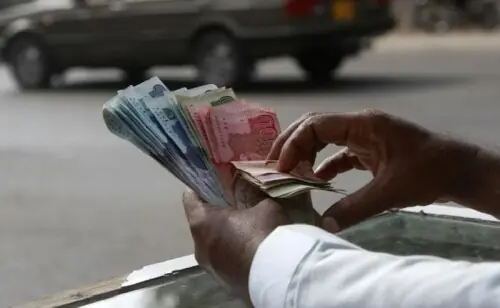
• Islamabad asked to provide consular access to Indian spy
• FM Qureshi welcomes verdict as Pakistan’s victory
THE HAGUE: The International Court of Justice (ICJ) on Wednesday rejected India’s request for acquittal, release and return of Kulbhushan Jadhav, an Indian serving naval commander sentenced by Pakistan on charges of espionage and terrorism, but asked Islamabad to provide him consular access under the Vienna Convention.
The United Nations’ top court, in its verdict after two-year-long proceedings, ruled an effective review and reconsideration of the sentence by Pakistan, by the means of its own choosing of legislation.
“The court notes that Pakistan acknowledges that the appropriate remedy in the present case would be effective review and reconsideration of the conviction and sentence,” the ICJ verdict read, supporting Pakistan’s stance.
Foreign Minister Shah Mehmood Qureshi termed the decision a victory of Pakistan.
Commander Jadhav would remain in Pakistan and would be treated in accordance with the law of the country, he said in a tweet following the ICJ ruling.
The Hague-based court in response to India’s plea to release Jadhav and facilitate his safe passage to India said, “It is not the conviction and sentence of Mr Jadhav, which are to be regarded as a violation of Article 36 of the Vienna Convention.” The court did not accept India’s contention that Jadhav was entitled to ‘restitutio in integrum’ (restoration to original position) and turned down its request to annul the decision of Pakistan’s military court.
Instead, it ruled that Pakistan by the means of its own choosing could undergo an effective review and reconsideration of the sentence awarded to Jadhav.
President of the ICJ Judge Abdulqawi Ahmed Yusuf read out the 42-page decision in a public sitting at the Peace Palace’s courtroom packed with officials, representatives and media persons from Pakistan and India.
The court accepted Pakistan’s point that Jadhav was an Indian national possessing a valid Indian passport in the name of Hussein Mubarak Patel and said it was satisfied that the evidence before it left no room for doubt that Jadhav held Indian nationality.
The court did not uphold submission by India that the “partial or total annulment of conviction or sentence provided the necessary and sole remedy.” It also declared that a continued stay of execution constituted an indispensable condition for the effective review and reconsideration of Jadhav’s conviction.
In its verdict, the ICJ ruled that it had the jurisdiction to entertain the application of India under the Vienna Convention as it had the jurisdiction under Article 1 of the Optional Protocol concerning the Compulsory Settlement of Disputes to the Vienna Convention on Consular Relations of April 24, 1963.
Earlier, Pakistan had argued that Article 36 of Vienna Convention was not applicable in cases of espionage.
Accompanied by English Queens counsel Barrister Khawar Qureshi, a 13-member Pakistani delegation, led by Attorney General Anwar Mansoor along with the Foreign Office’s Director General South Asia Dr Mohammad Faisal and comprising officials of the ministries of law and foreign affairs, was present in the courtroom.
The case proceedings were shown live from the courtroom and shared by the ICJ’s website for real-time update for the viewers worldwide.
Attorney General Mansoor told reporters outside the courtroom that the decision clearly stated that Jadhav would remain in custody of Pakistan.
“This is a clear, clear win for Pakistan,” he asserted.
The AG said Pakistan had been very clear from the outset and would consider the review and reconsideration as per the law of land.
Foreign Office spokesman Dr Faisal said having heard the judgement, Pakistan would now proceed as per law.
‘Pakistan’s stance vindicated’
Addressing a press conference, Foreign Minister Qureshi welcomed the ruling of the ICJ saying it had vindicated Pakistan’s stance regarding involvement of a serving Indian army officer in espionage and terrorist activities in the country.
Congratulating the nation, Mr Qureshi said he felt satisfaction over the ruling which “was a victory for Pakistan”.

Pakistan, he said, had emerged triumphant in the case which was a moral victory. The ICJ’s findings were “suitable” and “a welcoming decision”, he added.
Mr Qureshi said the ICJ findings were an implicit recognition and acceptance of Pakistan’s stance regarding Jadhav’s involvement in espionage and terrorism activities to which he had also voluntarily admitted.
He said in its ruling regarding review and reconsideration over the case, one thing must be taken into notice as the court held “by means of its own (Pakistan) choosing” implied that Pakistan would itself decide over it.
The ICJ had expressed its confidence in the justice and legal system of Pakistan, which was also an implicit acknowledgement, he added.
He said after conviction, Jadhav had different legal forums available in Pakistan, he could have filed a review petition, could have approached the high court and then the apex court, and after availing all those forums, he could have moved a clemency appeal. But instead, the Indian side approached the ICJ.
Mr Qureshi said it was interesting to note that the ICJ had not annulled the military court’s conviction and sentence handed over to Jadhav.
He said the ICJ’s findings were a pleasant commentary on Pakistan’s comprehensive legal system.
A serving naval officer was arrested after travelling on an authentic Indian passport, so where his trial would be held as the Army Act was clear on it, he said, adding that the Indian Army Act had the same procedure.
He said the customary laws were applied to the arrested spy.
The director general of Inter-Services of Public Relations, Maj Gen Asif Ghafoor while talking to a private TV channel termed the ICJ’s decision a big victory for Pakistan. He hailed the international court for upholding Pakistan judiciary’s decision and appreciated the hard work put in by the attorney general, his team as well as the Foreign Office throughout the hearing of the case.
He pointed out that the ICJ had rejected India’s plea that Pakistan military court’s judgement should be declared in contravention of international law. Indian request to get the military court’s sentence overturned was also turned down, he said. India had sought the release of Jadhav and his return to his home country but the ICJ rejected this request too.
The DG stressed that even the review and reconsideration of the sentence awarded by the military court to Jadhav had been allowed to the “means of Pakistan’s choosing”, adding this clearly validated Pakistan’s judicial system.
He pointed out that the field general court martial of the military is an extension of Pakistan’s judicial system and not a separate law.
“It’s a wonderful decision,” he said, adding Pakistan would act as the law required.
When his attention was invited to reports that India was terming the ICJ’s decision its victory, Maj Gen Ghafoor said today it’s another February 27 for India — referring to the standoff when Pakistan downed two Indian warplanes and caught one of its pilots and yet India kept making false calims.
Jadhav was arrested on March 3, 2016 in a counter-intelligence operation from Balochistan. A military court had awarded him death sentence on April 10, 2017 on charges of espionage following his confession that he had operated for India’s Research and Analysis Wing to conduct terrorist activities on Pakistani soil.
India had invoked the jurisdiction of ICJ on May 8, 2017 seeking stay in implementation of Jadhav’s execution and later expanded its prayer for consular access and also his acquittal, release and return.
The 15-member ICJ bench had reserved its decision on February 21, after hearing oral submissions by Pakistan and India.
Published in Dawn, July 18th, 2019

































